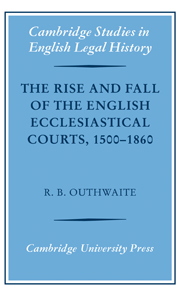Book contents
- Frontmatter
- Contents
- Foreword by R. H. Helmholz
- Preface
- Table of parliamentary statutes
- List of abbreviations
- 1 The ecclesiastical courts: structures and procedures
- 2 The business of the courts, 1500–1640
- 3 Tithe causes
- 4 Wills and testamentary causes
- 5 Defamation suits
- 6 Marital suits and marriage licences
- 7 Office causes
- 8 The roots of expansion and critical voices
- 9 Charting decline, 1640–1830
- 10 Explaining decline
- 11 The bills of 1733–1734
- 12 Snips and repairs: small steps to reform, 1753–1813
- 13 Royal commissions and early fruits, 1815–1832
- 14 Reform frustrated
- 15 Reforms thick and fast, 1854–1860
- Select bibliography
- Index
15 - Reforms thick and fast, 1854–1860
Published online by Cambridge University Press: 21 January 2010
- Frontmatter
- Contents
- Foreword by R. H. Helmholz
- Preface
- Table of parliamentary statutes
- List of abbreviations
- 1 The ecclesiastical courts: structures and procedures
- 2 The business of the courts, 1500–1640
- 3 Tithe causes
- 4 Wills and testamentary causes
- 5 Defamation suits
- 6 Marital suits and marriage licences
- 7 Office causes
- 8 The roots of expansion and critical voices
- 9 Charting decline, 1640–1830
- 10 Explaining decline
- 11 The bills of 1733–1734
- 12 Snips and repairs: small steps to reform, 1753–1813
- 13 Royal commissions and early fruits, 1815–1832
- 14 Reform frustrated
- 15 Reforms thick and fast, 1854–1860
- Select bibliography
- Index
Summary
THE ‘TAKING EVIDENCE’ ACT OF 1854
Robert Phillimore, both an MP and a civilian practising in the court of admiralty, had on at least one previous occasion attempted to preserve the ecclesiastical courts by advocating measures to strengthen rather than weaken their position. In 1854 he presented a Bill to alter and improve the mode of taking Evidence in the Ecclesiastical Courts …, a bill that permitted the viva voce examination of witnesses in the church courts. It quickly passed the Commons and met with approval from lawyers on all sides in the Lords. Lord Campbell confessed to having reservations, fearing that this change would simply prop up, and postpone reform of, institutions ‘already doomed’. ‘It appeared’, he said, ‘that those Courts had a charmed life, and were immortal.’ He was reassured, however, by the Lord Chancellor's pledge that this measure was ‘an instalment of Ecclesiastical Court reform’, simply one among a whole raft of reforms that were shortly to be introduced. From the viewpoint of the survival of the ecclesiastical courts, however, Phillimore's bill was a case of too little, too late. It is even doubtful that this measure led to any significant change in court procedure. Parliamentary critics were still complaining two years later that ‘if any scheme could have been devised by the wit of man less adapted than another to the bringing forxth of the whole truth of a case, it was this mode of written examination and written cross-examination’.
- Type
- Chapter
- Information
- Publisher: Cambridge University PressPrint publication year: 2007



